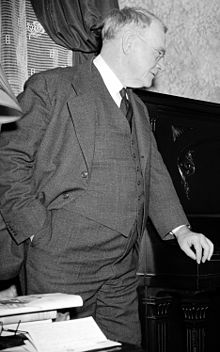Fred C. Gilchrist
Fred Cramer Gilchrist (born June 2, 1868 in California , Washington County , Pennsylvania , † March 10, 1950 in Laurens , Iowa ) was an American politician . Between 1931 and 1945 he represented the state of Iowa in the US House of Representatives .
Career
In 1871, Fred Gilchrist came to Cedar Falls , Iowa with his parents . There he attended the public schools and then until 1886 the State Teachers College . He was a teacher between 1886 and 1892, and between 1890 and 1892 he also oversaw the public schools in Pocahontas County . After studying law at the University of Iowa in Iowa City and his admission as a lawyer in 1893, he began to practice in Laurens in his new profession.
Gilchrist was a member of the Republican Party . Between 1902 and 1904 he was a member of the Iowa House of Representatives . From 1905 to 1928 he was the head of the Laurens Community Education Committee. Between 1923 and 1931 Gilchrist was a member of the Iowa Senate .
In 1930 he was elected to the US House of Representatives in Washington, DC , in the tenth constituency of Iowa , where he succeeded Lester J. Dickinson on March 4, 1931 . Since his district was dissolved after the end of his first legislative term, he was confirmed in the following elections up to 1940 in each case in the eighth district, where he replaced Lloyd Thurston on March 4, 1933 . During his last term in Congress from 1943 to 1945, Gilchrist represented the fifth district of Iowa as the successor to Paul Cunningham . Overall, he served between March 4, 1931 and January 3, 1945 in the US House of Representatives, where he represented three electoral districts. During this time, were New Deal -Gesetze the federal government under President Franklin D. Roosevelt passed in Congress, the consequences of that help global economic crisis could be gradually overcome. The last two legislatures of Gilchrist were overshadowed by the events of World War II . Also during his time in Congress, the 20th and 21st amendments were discussed and passed. The deadlines between the congressional or presidential elections and taking office were shortened and the 18th amendment to the constitution , the prohibition law from 1919, was repealed. In 1944 Gilchrist lost his party's primary election and was therefore no longer nominated for a further term.
In the following years he retired to Laurens, where he worked as a lawyer again and died in 1950.
Web links
- Fred C. Gilchrist in the Biographical Directory of the United States Congress (English)
- Fred C. Gilchrist in the database of Find a Grave (English)
| personal data | |
|---|---|
| SURNAME | Gilchrist, Fred C. |
| ALTERNATIVE NAMES | Gilchrist, Fred Cramer (full name) |
| BRIEF DESCRIPTION | American politician |
| DATE OF BIRTH | June 2, 1868 |
| PLACE OF BIRTH | California , Pennsylvania |
| DATE OF DEATH | March 10, 1950 |
| Place of death | Laurens , Iowa |

